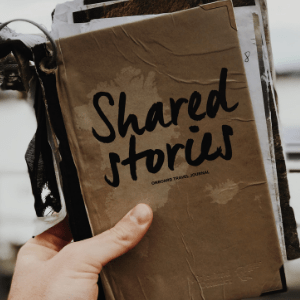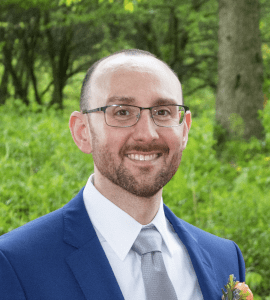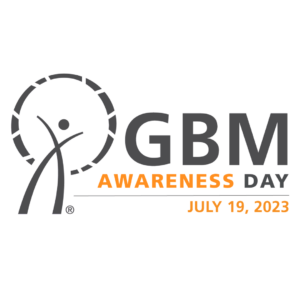When you read Steve’s blog, Cancer of the Brain, Not the Mind, you’re struck by how this lawyer-turned-brain tumor advocate vividly details his brain tumor journey.
Words that precisely yet eloquently describe the emotional and physical effects as he takes you alongside his journey. In one of Steve’s blog post, he describes the difficulty of sharing his diagnosis with his mother.
He writes, “I stared at the name “Mom” [on my cellphone] a thousand times until I could get up the courage to tell her the news. My father died six months ago from cancer, and after 40 years of marriage, my mom was just trying to restart her life while dealing with an incredible sadness and responsibility to make sure her two boys were okay. Ring, ring, ring… “Hi Mom”…my lips trembled and my body shook with the violence of an earthquake.”
Someone Who Gets It
Whether on a blog, vlog, social media or other medium, sharing stories and storytelling has many benefits for yourself and others.
Several ABTA programs and educational meetings and conferences include an aspect of shared experiences with the larger brain tumor community. Often patients and caregivers who share their stories offer candid information, tips and nuanced perspectives that only those who have gone through a similar journey can provide.
Among ABTA programs and services, ABTA Connections, a free and active online discussion group is available to ask for advice, find out about treatment or how to manage symptoms among more than 20,000 members across the country and around the world. Importantly, it’s a platform to stay connected, particularly relevant during the pandemic.
Likewise, ABTA Patient and Family Meetings and National Conference, which always includes topics on medical advances in treatment and management, also includes a popular session with a panel of patients and caregivers. Panelists reveal their mindset, strategies and surprises along their own brain tumor journey. Audience members often report they feel most connected to each other when they hear and interact with panelists, because there’s someone who “gets it.”
Additionally, brain tumor patients and caregivers who are part of our peer-to-peer mentor program have each found invaluable experiences, solace and power in sharing their stories with each other.
Belonging and Building Your “Store of Knowledge”
What drives us to share our story and our experiences with others?
According to ABTA’s Patient Services team, sharing stories and real experiences from patients, caregivers and families are crucial to learning new perspectives and feeling part of a community with common experiences and goals. Surveys of ABTA programs and educational meetings relay participants, whether patients, caregivers or families, overwhelmingly feel more connected with those who understand their unique experiences. Participants have also reported physiological and emotional improvements, such as reduced anxiety and stress, along with acquiring necessary information and inspiration for moving forward on their journey.
Not surprising that scholarly research show that individuals are motivated to share experiences for a stronger sense of social connection (the feeling that you belong to a group and generally feel close to other people, which is a core psychological need).1 Furthermore, researchers extrapolate that sharing experiences and establishing social connections has an ultimate goal of sharing information with others to help facilitate decision-making and build a collective ‘store of knowledge.’2 This knowledge bank is helpful for patients and caregivers who face myriad decisions along the brain tumor journey.
A Vessel to Help Others

At first, Steve of the Cancer of the Brain, Not of the Mind blog, didn’t feel that it was necessary to share his story with others. “I didn’t feel like I had a remarkable story, until I was inspired by another brain tumor survivor in my support group. He was diagnosed with a glioblastoma 15 years ago and it motivated me to share my unique experience with others,” said Steve.
Steve felt that while hearing medical advice from doctors and nurses is helpful; hearing the details – the ups and downs of life after a brain tumor diagnosis – from someone who went through the journey, could help put things in perspective.
As a nine-year survivor of grade III anaplastic astrocytoma, Steve saw himself as a vessel to help others. He started this blog and participated in other storytelling opportunities, including a guide, “Speaking Frankly About Brain Tumors,” a comprehensive resource for patients, caregivers and families impacted by a brain tumor diagnosis. Steve has gone on to tell his story at his local news station, during Brain Tumor Awareness Month and as a peer-to-peer mentor at the ABTA. This year, Steve will be a featured guest contributor for the ABTA’s e-newsletter, MindMatters.
If It Feels Right
Sharing stories and your journey has been shown to offer many benefits: from staying connected with others; helping others get information to having some relief from stress and/or anxiety. However, sharing your brain tumor experience and story as a patient, survivor or caregiver may not be right for everyone.
Consider what feels right to you and if you’d like to get started with sharing your story, submit yours to the ABTA’s Share Your Story.
___________
1Greater Good Magazine: Science-based insights for a meaningful life. “What is Social Connection.” Accessed on 12.29.20 at https://greatergood.berkeley.edu/topic/social_connection/definition.
2Jolly E, Tamir DI, Burum B, Mitchell JP. (2019) Wanting without enjoying: The social value of sharing experiences. PLoS ONE 14(4): e0215318. https://doi.org/10.1371/journal.pone.0215318.




















